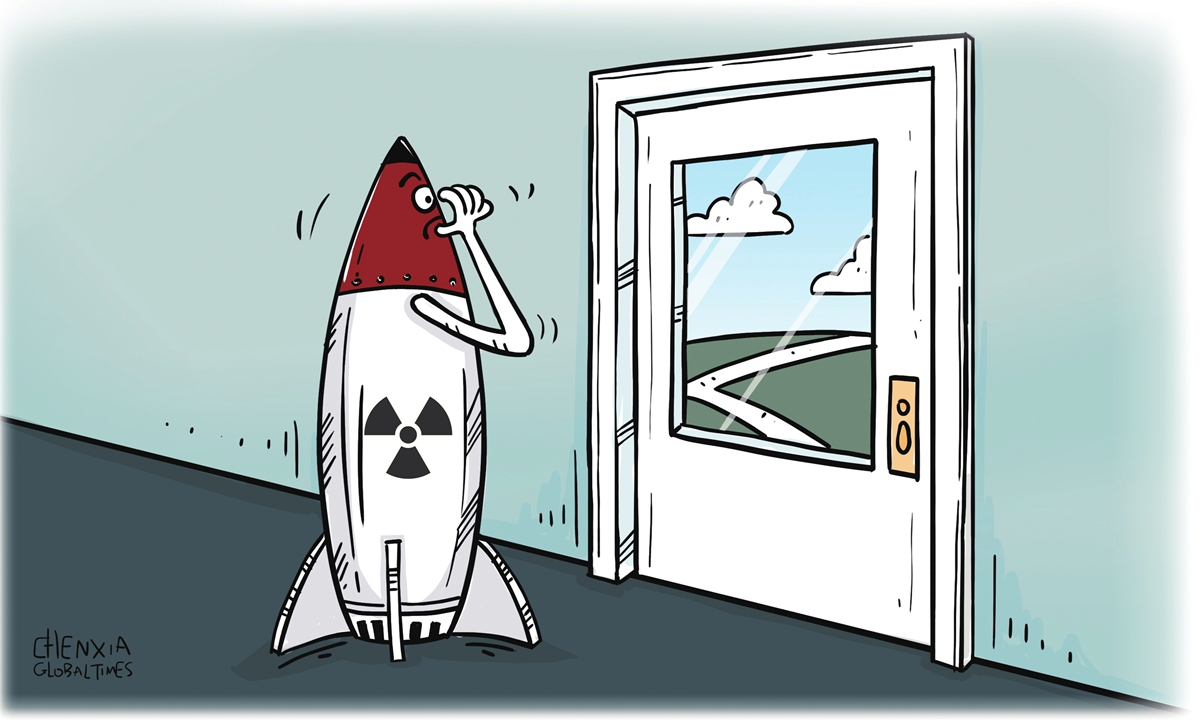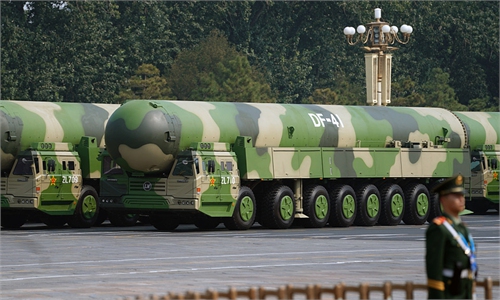
Illustration: Chen Xia/Global Times
Leaders of the five Nuclear-Weapon States, namely China, France, Russia, the UK and the US on Monday issued a joint statement on preventing nuclear war and avoiding arms races. This is the first time for leaders of the five nuclear-weapon states to issue such a joint statement.
This statement by the five permanent members of the UN Security Council (known as the "P5") can be regarded as a gift of peace to the whole world. It conveys a clear signal that even if there are contradictions among the five countries, no nuclear war will be triggered.
Washington sees Beijing as its top rival and engages in competition within all fields including that of the military. Additionally, the international community is worried about the possible scenario of military confrontation between Russia and the US over Ukraine. This joint statement can dispel the anxiety of the outside world. The five countries may sometimes vent anger toward each other because of their confrontations, but they will not press the nuclear button. This has certainly assured the world.
China has always been advocating the idea that "a nuclear war cannot be won and must never be fought," and has been playing a leading role in promoting the five countries taking joint actions. Among the P5, China has always been prudent and rational toward nuclear issues and strived to contribute to nuclear arms control and prevent nuclear proliferation. Such a joint statement means China's approach and policy on nuclear weapons have been met with approval from the other four countries of the P5.
The risks of nuclear proliferation still exist across the world. For example, the US, UK and Australia in September 2021 announced the formation of an enhanced trilateral security partnership called "AUKUS," which will support Canberra in acquiring nuclear-powered submarines and enable nuclear-powered submarines to patrol the Indo-Pacific region. Some analysts said they were touching the bottom line of the non-proliferation of nuclear weapons.
This joint statement by the P5 demonstrates that other countries, such as China, Russia and France, may have piled some pressure on the US against AUKUS, and urged Washington to take more responsibility. The US seems to have made compromises in response.
The joint statement will to some extent restrain the US' development of nuclear weapons, as well as its practices in spreading nuclear technology to its allies through small US-led cliques, such as the AUKUS. The statement by the P5 drew a red line on nuclear proliferation - nuclear weapons, as well as weapons-grade highly enriched uranium, will not spread.
If the US breaks through certain contents or principles in this statement, it will face more queries and criticisms. In the future, Washington's arms sales will encounter increasing restraint and supervision from the other four P5 members. Corresponding supervision mechanisms will limit the US and the UK in providing Australia with nuclear-powered submarine technology. Against this backdrop, it remains to be seen whether Canberra can acquire nuclear-powered submarines or what kinds of limitations will be set for putting the submarines into use.
However, Washington is good at saying one thing and doing another. Sometimes, the US takes good advantage of the loopholes within policies or plays conspiratorial tricks. For example, US President Joe Biden said that the US is "not seeking a new cold war or a world divided into rigid blocs" at the UN General Assembly, yet almost at the same time, the AUKUS was established.
Therefore, the possibility that Washington will take measures to evade restrictions on providing nuclear-powered submarines cannot be ruled out. China, Russia and other countries should keep a close eye on such issues and remain vigilant toward the US' intent.
The author is a Beijing-based military analyst. opinion@globaltimes.com.cn

